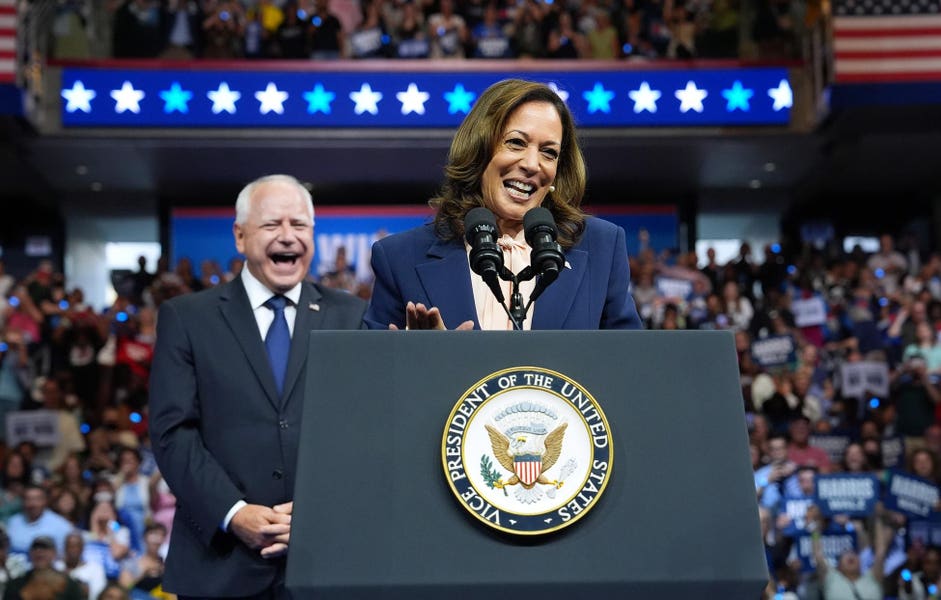In selecting Governor Tim Walz (D-Minn.) to be her vice presidential nominee this November, Kamala Harris chose a running mate whose record on tax policy is more in line with her own than that of the other reported finalist, Governor Josh Shapiro (D-Penn.). Governor Walz, like Vice President Harris, has a well-documented history of supporting tax hikes and progressive tax proposals.
Shapiro, however, in arguing for an acceleration of the phased-in corporate rate reduction enacted by his predecessor, has made recent statements about the economic benefits of reducing corporate tax burdens and increasing competitiveness through lower rates. Those comments, had Shapiro been selected as Harris’s running mate, could’ve been employed against Kamala Harris and her proposal to raise the federal corporate tax rate to 35%.
Governor Walz, meanwhile, has a tax policy record that, like Harris’s, is geared toward the goals of the Democratic Party’s progressive base. In 2023, for example, Governor Walz and the Democratic-controlled Minnesota Legislature spent an almost $18 billion surplus in a single year while enacting nearly $10 billion in higher taxes.
“While this year’s tax hikes are bad, what’s really going to shock Minnesotans is what happens in the next budget when we don’t have a huge surplus to spend,” Senator Steve Drazkowski (R-Mazeppa) said last year in response to the tax hikes pushed by Governor Walz and Democratic legislators. “Every Minnesotan will be hit by these tax increases, whether they are shopping in the metro, buying a new car, or updating their tabs,” Senator Bill Weber (R-Luverne) added.
Economic Impact and Population Trends
During Tim Walz’s tenure as Governor, Minnesota has been a national outlier, one of the few states where residents have not received state tax relief. “Most states have cut taxes at least once since 2021, with a renewed emphasis on tax competition taking hold in red and blue states alike,” writes Jared Walczak, vice president of state projects at the Tax Foundation. “Twenty-eight states have cut individual income tax rates, fifteen states have cut corporate tax rates, and other states have cut sales tax rates or focused on relief. Under Gov. Tim Walz, Minnesota has been an outlier, one of the few states to raise taxes in recent years—despite the state posting large surpluses.”
“In recent years, Minnesota has doubled down on its status as a high-tax state even as most states have moved in a different direction,” Walczak added. “That may go some way toward explaining the state’s lackluster economic performance of late: in the past year, employment only grew by 0.7% in Minnesota, ranking 42nd nationwide. Net outmigration to other states is sixth highest for households with $200,000 or more in income, and eighth highest in terms of net outflow of income from all households.”
Unlike Shapiro, it will be difficult to argue that Walz is a moderate. Governor Walz’s first budget proposal was even criticized by the Minneapolis Star-Tribune editorial board, no bastion of conservative thought, as too profligate. The Star-Tribune described Governor Walz’s first budget proposal as “too big,” noting that it would increase state spending “by more than $2 billion and taxes by at least $1.2 billion, substantially more if the state extends a health care provider tax that sunsets at the end of 2019.”
With Tim Walz, Kamala Harris has chosen a running mate who, like she, hails from a Democratic-controlled state that has been raising taxes and losing population. While population outmigration has been occurring in California for many years, it’s a more recent phenomenon in Minnesota, one that coincides with Walz’s tenure in office. “Under Governor Walz, Minnesota’s population growth has cratered — as it has for the United States generally — but that cratering has been worse here,” writes Josh Phelan, an economist at the Center for the American Experiment, a Minnesota-based think tank.
“Looking at Census Bureau population data for 2010-2020 and 2020-2023, we see that Minnesota’s population grew in the four years of Gov. Walz’ administration (2019 to 2023) by 0.4%, fractionally below the growth rate for the United States overall of 0.5%,” Phelan adds. “But if we look at the four preceding years (2015 to 2019), we see that Minnesota’s population grew more quickly than that of the United States generally, by 2.8% compared to 2.4%.”
Many pundits and political operatives are criticizing Kamala Harris’s decision to choose Tim Walz as her running mate. Setting aside political calculations, many of which argue against picking the Minnesota governor, there is a case to be made that Walz is a better fit for Harris due to substantive policy considerations. When it comes to the direction in which Harris has said she wants to take federal tax policy, Governor Walz’s record and public statements are more in-line with Harris’s vision than are Shapiro’s.
“Vice President and presumptive Democratic presidential nominee Kamala Harris has a record of favoring steeper tax hikes on businesses and people than President Biden,” note Erica York and Garrett Watson, economists at the Tax Foundation. “While both President Biden and Vice President Harris aim their proposed tax hikes on businesses and high earners, key differences between their tax ideas in the past reveal where Harris may take her tax policy platform in the 2024 campaign.”
“In all, Tax Foundation estimates the major tax increase proposals in the Biden-Harris FY 2025 budget would reduce economic output by 1.6% and employment by 666,000 full-time jobs,” York and Watson added. “If Harris took the tax increases further, as she has supported in the past, the economic losses would be even larger.”
If Governor Shapiro is disappointed he didn’t get the nod to be Harris’s running mate, he can take consolation in the fact that he won’t have to spend the next three months explaining why he supports Kamala Harris’s proposal to raise the federal corporate tax rate to 35% when, not that long ago, he told the Wall Street Journal editorial board that raising the corporate tax rate would “put U.S. companies in an uncompetitive situation.”





